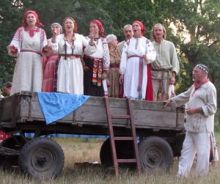It became the first artistic event in the country to make use of the traditional Ukrainian cart — a truly multifunctional item from Cossack times, which served as a vehicle, bed, and fortification — as a stage and exhibition stand for folk singers and bands, the carriers of authentic tradition.
The choice of the venue for the festival was no mere coincidence: the festival orbit included the town of Svitlovodsk on the Dnieper, as well as the nearby villages of Pavlysh, Popivka, Kamburliivka, Onufriivka, Mlynok, and Kalantaiv. This spot is part of the territory of present-day Kirovohrad oblast, where in the 17th-18th centuries the borders of three states met, Ukraine (the Zaporizhia Host), Poland (Rzeczpospolita Polska), and Russia (Muskovite Tsardom).
This place at the frontier, on the River Omelnyk which flows into the Dnieper, was chosen by the Polish novelist Henryk Sienkiewicz for an encounter of his characters, Bohdan Khmelnytsky and Jan Skrzetuski. Jerzy Hofman, a famous Polish film director, later based his film With Fire and Sword on Sienkiewicz’s eponymous novel. There are plans to erect a monument at the place of this famous encounter.
Nowadays this region is famous for its picturesque landscapes, especially along the banks of the Dnieper and the Reservoire of Kremenchuk, and a marvellous Onufriivsky park, a monument of landscape architecture of the 18th-19th centuries. It is also associated with some celebrities, such as the author of the first Ukrainian symphony Mykhailo Kolachevsky, and the outstanding Ukrainian educator Vasyl Sukhomlynsky.
The participants lived up to the public’s expectations. Among them was the famous band Drevo (artistic director Yevhen Yefremov) from Kyiv — the first band, starting 30 years ago, in Ukraine to perform Ukrainian folk songs in an authentic manner. They were accompanied by a renowned virtuoso, the violinist Serhii Okhrimchuk, who impressed everyone with traditional Boiky tunes.
There was also a youth band Dyke Pole from Kirovohrad, whose main schtick are songs of right-bank Ukraine between the Dnieper and the Syniukha River (Polish maps of the 17th c. refer to these lands as Dzikie Pola, whence the band’s name). Local tradition was represented by a folk band from the village of Kalantaiv.
Homegirls from the amateur band Pavlyshanka, albeit performing so-called secondary folk (to the accompaniment of the accordion), were nevertheless perky and full of pep. The representatives of the art project “Chuck it all when the accordion is playing,” also fit in nicely with the rest of the fest hodgepodge, together with the project’s founder (since 1987), Artur Budulatiev. Each year he masterminds up to 20 contests and concerts of amateur artists in various raions. The participants are enthusiasts of accordion music, without age limitations. This time, the accordionists amused the public with popular tunes and stirring folk dances.
But it was the band Virtualnaya Derevnya (Virtual Village) that grabbed the headlines. The group was born more than 25 years ago, when a few students of the Moscow Conservatory joined together to start a folk band that performed songs recorded by the members in distant Russian villages. On graduation, most of them returned home. Only in the early 2000s did they meet again to revive the old band by holding annual “sessions” with old and new repertoire, songs from Ryazan, Tver, Penza and other oblasts of the Russian Federation.
As all of them were able to establish and realize themselves, I cannot but name all of the members of Virtualnaya Derevnya, who arrived in Onufriivka as one big family — almost 40 persons with spouses and children.
Sergei Starostin is doubtlessly a true star among them. A singer, performer of traditional Russian wind instruments (horns, flutes, etc.) and a percussionist, he also collects traditional instruments. He has been nominated for BBC-3, World Music Award 2003, and holds Euroradio’s Grand Prix Award. At the festival he played the acoustic dulcimer and sang, solo and in duet with his daughter Maria. His wife Olga Lapshina, an authentic-style singer, is a good match for him.
The couple Svitlana Kontsedalova — Oleksandr Poliachok deserve a more detailed description. Svitlana is the leading singer in a band, and possesses a clear, ringing, powerful alto. Oleksandr is a music critic, educator, and public figure. Since 1987 he has lived in his home town, Kirovohrad. He initiated the foundation of the Kirovohrad Museum of Music Culture, and was its first director. Poliachok promoted the opening of the museums of the painter Osmiorkin and playwright Karpenko-Kary, as well as the erection of the monument to Khmelnytsky. No one else but Poliachok initiated the Perekotypole Festival, and later became its director. It was his idea to use the stadium in Onufriivsky Park as the festival venue — using a semicircle of bright, ornamental carts and well-groomed horses with manes decorated with colored ribbons.
The main events unfolded in the park: an exhibition of local traditional craftsmen, and a marquee with local delights. Everyone might taste the delicious kulish and garlic-flavored donuts. The bands, up on their carts, took turns to perform their national songs of various genres: there were harvest and wedding songs, comic, lyrical and dance songs, and instrumental pieces. Anyone could take part in the performance.
The festival also featured master classes, best singer contests, professional research into the peculiarities of Russian, Polish and Ukrainian folklore. There were excursions in the vicinity, including visits to the local stud farm, and boating.
So the festival achieved its goal, which was to popularize local folk art and ethnography, of Ukraine and other nations, and develop friendly relations and partnership between Ukrainians, Poles, Russians, etc. Perekotypole Festival is open to broad international cooperation, it has good prospects and every reason to become one of the hallmarks of Kirovohrad oblast.







